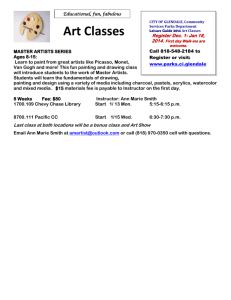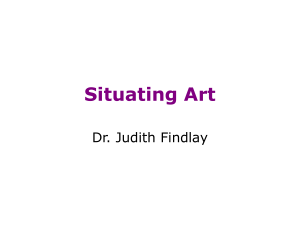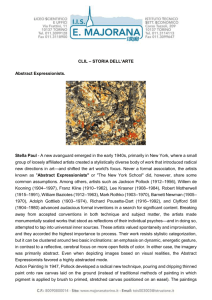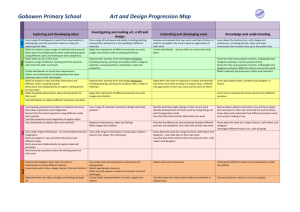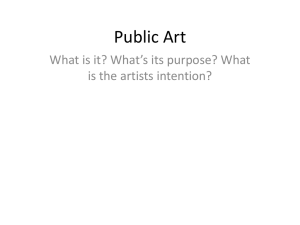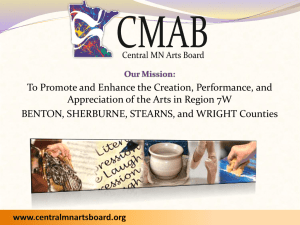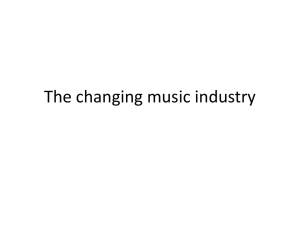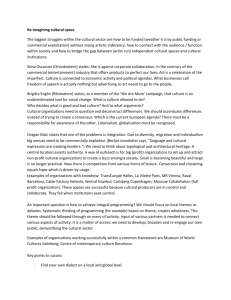Van Gogh Cezanne – “Father of Modern Art”
advertisement
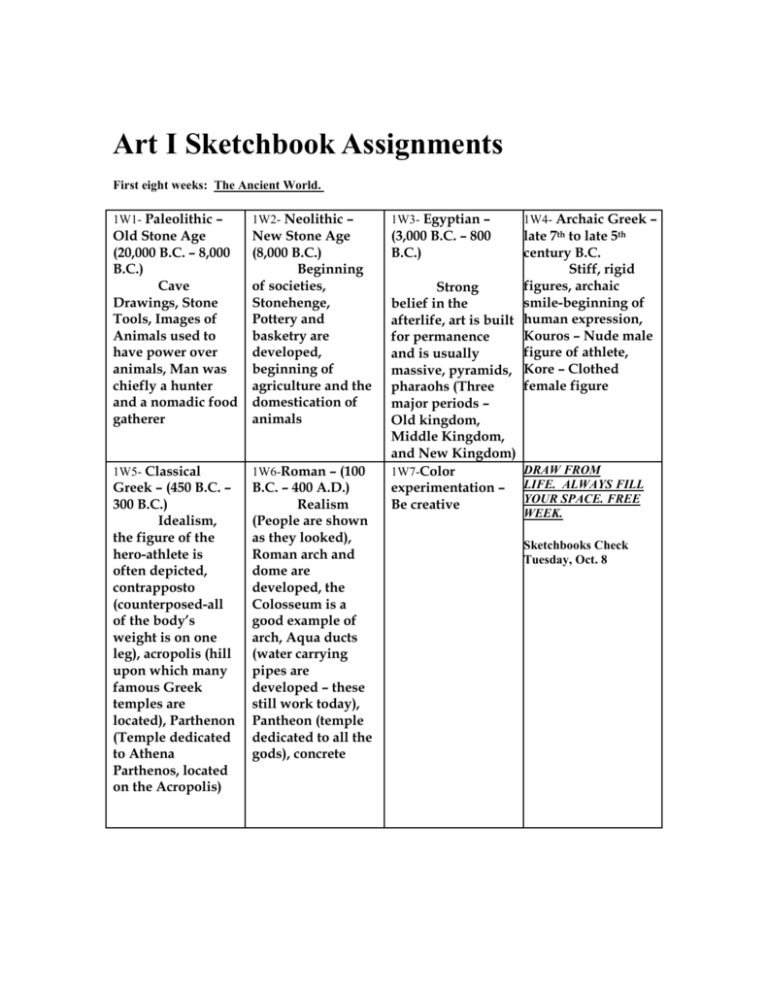
Art I Sketchbook Assignments First eight weeks: The Ancient World. 1W1- Paleolithic – 1W2- Neolithic – 1W3- Egyptian – Old Stone Age (20,000 B.C. – 8,000 B.C.) Cave Drawings, Stone Tools, Images of Animals used to have power over animals, Man was chiefly a hunter and a nomadic food gatherer New Stone Age (8,000 B.C.) Beginning of societies, Stonehenge, Pottery and basketry are developed, beginning of agriculture and the domestication of animals (3,000 B.C. – 800 B.C.) 1W5- Classical 1W6-Roman – (100 Greek – (450 B.C. – 300 B.C.) Idealism, the figure of the hero-athlete is often depicted, contrapposto (counterposed-all of the body’s weight is on one leg), acropolis (hill upon which many famous Greek temples are located), Parthenon (Temple dedicated to Athena Parthenos, located on the Acropolis) B.C. – 400 A.D.) Realism (People are shown as they looked), Roman arch and dome are developed, the Colosseum is a good example of arch, Aqua ducts (water carrying pipes are developed – these still work today), Pantheon (temple dedicated to all the gods), concrete 1W4- Archaic Greek – late 7th to late 5th century B.C. Stiff, rigid figures, archaic Strong smile-beginning of belief in the afterlife, art is built human expression, Kouros – Nude male for permanence figure of athlete, and is usually massive, pyramids, Kore – Clothed female figure pharaohs (Three major periods – Old kingdom, Middle Kingdom, and New Kingdom) DRAW FROM 1W7-Color experimentation – LIFE. ALWAYS FILL YOUR SPACE. FREE Be creative WEEK. Sketchbooks Check Tuesday, Oct. 8 Second Eight Weeks-The Middle Ages 2W1- Early Christian 2W2- Romanesque and Byzantine (300 (1000 – 1150 A.D.) A.D. – 1000 A.D.) Return to Fall of the the rounded Roman Empire – A.D. arches of the 476 Roman Dark Ages in Empire. Europe begin Leaning Mosaics – Tower of Icons – Pisa is a Illuminated good manuscripts – example. calligraphy. Growth of The book of the urban Kells is best middle known. class. Guilds are formed. 2W3- Gothic (1200- 2W4- The 1300) Renaissance (1300 – 1500) The word renaissance means “Rebirth” There was a rebirth of interest in the classics Individualism Michelangelo and Leonardo Da Vinci were the two greatest artists of the period, although there were many others 2W5-Baroque (1500- 2W6- A style 1700) Many famous artists emerged including Peter Paul Rubens, El Greco, Frans Hals, Velasquez, Rembrandt, Vermeer, Poussin and Caravaggio referring to 18th century France. It is characterized by charming, colourful costumes and gracious movements and generally dealt with the life at the French court. Famous artists of the period were Watteau, Fragonard and Boucher Period ends with the execution of Marie Antionette and King Louis XVI when the French Revolution starts 2W7-Draw a Third Eight Weeks-The Modern World Spirituality and Mysticism Age of the great cathedrals – rose windows – pointed arches Reflective surface from direct observation DRAW FROM LIFE. ALWAYS FILL YOUR SPACE. FREE WEEK. Sketchbooks Check Wednesday, Dec. 11 3W1- Neoclassissism 3W2-Impressionism and Romanticism (1850-1880) (1780-1850) Dealt with the Neoclassissical is effect of light on any style which color resembles the ancient Painted outdoors classical Greek or rapidly with large Roman manner of brushes painting or sculpture. This art movement Romanticism received its name emphasized rejection from Claude against society and Monet’s painting rebellion. It dealt “Impression with the themes of Sunrise” power, violence, and the study of emotion. Major artists were Claude Monet, Auguste Renoir, Edgar Degas, Mary Cassatt, Pissarro and Sisley. 3W5- Fauvism 3W6- German Introduced in Paris in early 1900’s Characterized by areas of brilliant contrasting color and simplified shapes. The name “les fauves” is French for the wild beasts The leader of the Fauves was Henri Matisse (1869-1954) Other important artists of the period include Rouault (1871-1958), Vlaminck (18761958), and others. After World War I, this movement became less powerful. Expressionism Type of art which distorts forms & colors to show emotion Developed around and after WWI in Germany and other parts of Europe. Based on depressing and violent themes The emotion produced was what the artists wished to show, not what could be actually seen. Important artists: Munch (1863-1944) who painted The Scream & Franz Marc (Blue Horses) Fourth Eight Weeks-The 20th Century & Beyond 3W3- Post Impressionism (1880-1900) A general term referring to a period in the development of modern paintingrather than an actual movement. 3W4- Abstraction 3W7- Suspended Object, be Creative in your interpretation of this…. DRAW FROM LIFE. ALWAYS FILL YOUR SPACE. FREE WEEK. Art based on objects in the real world where the usual form of the object is changed Recognizable references to the actual object may Van Gogh Cezanne – be slight Began in early “Father of Modern part of the 20th Art” century Kandinsky (1866Gauguin 1944) was one of Rodin the major artists Toulouse-Lautrec Sketchbooks Check Wednesday March 5 4W1- Cubism (1900- 4W2- Surrealism 1930) Artists reduced the form of an object to simplified geometric elements which include spheres, cylinders, rectangles, etc. Important artists of the period were Picasso (1881-1973), and Braque (18821963). There were several others. The Ladies of Avignon (1907) by Picasso introduced the movement. (1920-present) Derived from Dada (the anti-style style) & cubism. Based upon the dream world, the irrational and the fantastic. The movement took 2 directions, one representational and one abstract. Rene Magritte (1898-1967) typifies representational Joan Miro (1893) is typical of abstract Other surrealists were Klee and Dali 4W3- Abstract 4W4- Pop Art Expressionism Originated in America Characterized by spontaneous action, exploitation of the accident and strong color value patterns. Large canvases give more impact Artists include Jackson Pollack (1912-1956) Franz Kline (1910-1962) Sometimes called Action Painting Developed in the late 1950’s in the U.S. Based on visual cliches and subject matter of mass media. Important artists include Andy Warhol (1930) and Roy Lichenstein (1923) 4W6- Minimal Art 4W7- Photorealism Style of 20th Century sculpture and painting restricted to visual elements Produces relatively simple geometric shapes. Strong revival of realist painting in the 1960’s and 70’s Painting that tries to imitate photography 4W5- OP Art (Optical Art) Two dimensional art that uses line or shapes of contrasting colors to create optical illusions. Important artists: Bridgett Riley and Vasarely DRAW FROM LIFE. ALWAYS FILL YOUR SPACE. FREE WEEK. Sketchbooks Check Tuesday May 13 Conceptual Art An idea – the artist On one of your independent pages, basically sells an please discuss the idea. idea of what art is in the 21st century, and Installations, where you think it Landscape Art, might go from here. Performance Art and many other things are now considered art.
